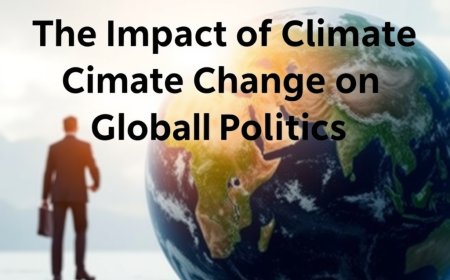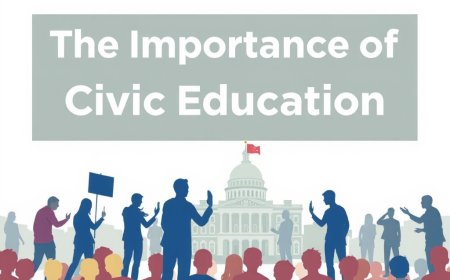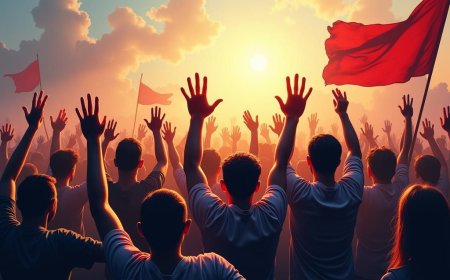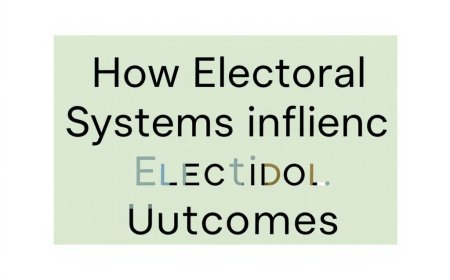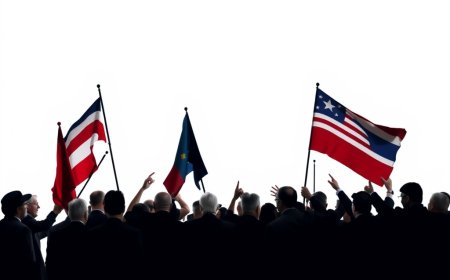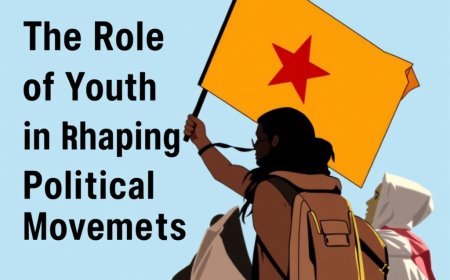How Political Protests Influence Government Decisions
Political protests have been a cornerstone of democratic societies, allowing citizens to express their grievances and push for change. From the civil rights movement in the United States to the anti-apartheid movement in South Africa, protests have played a crucial role in shaping government decisions and policies. In this article, we will explore how political protests influence government decisions, examining the various mechanisms through which protests can impact policy.
One of the primary ways in which protests influence government decisions is by bringing attention to specific issues. Protests can draw media coverage, sparking public debate and putting pressure on governments to respond. For example, the Black Lives Matter movement in the United States has highlighted issues of racial inequality and police brutality, prompting many governments to re-examine their policing practices and implement reforms. By raising awareness and generating public discussion, protests can create a sense of urgency around an issue, making it harder for governments to ignore.
Protests can also influence government decisions by mobilizing public support for a particular cause. When large numbers of people come together to protest, it can demonstrate to governments that there is a significant constituency demanding change. This can be particularly effective when protests are accompanied by other forms of activism, such as lobbying or petitioning. For instance, the women's suffrage movement in the early 20th century used a combination of protests, lobbying, and petitioning to secure the right to vote for women in many countries. By building a broad coalition of supporters, protests can create a sense of momentum around an issue, making it more likely that governments will take action.
In addition to raising awareness and mobilizing public support, protests can also influence government decisions by creating economic and social costs for governments that fail to respond. For example, protests can disrupt business as usual, causing economic losses and damaging a government's reputation. In some cases, protests can even lead to violence or unrest, creating a sense of instability that can be costly for governments to address. By creating these costs, protests can make it more expensive for governments to ignore an issue, making it more likely that they will take action to address it.
Furthermore, protests can influence government decisions by providing a platform for marginalized or underrepresented groups to voice their concerns. In many societies, certain groups may be excluded from the formal political process, either due to lack of representation or lack of access to decision-making institutions. Protests can provide a way for these groups to be heard, bringing their concerns to the attention of governments and the wider public. For example, the indigenous rights movement in many countries has used protests to highlight issues such as land rights and environmental justice, pushing governments to take action to address these concerns.
It's worth noting that the impact of protests on government decisions can vary significantly depending on the context. In some cases, protests may be met with repression or violence, making it difficult for protesters to achieve their goals. In other cases, protests may be co-opted or absorbed by the government, losing their momentum and impact. However, when protests are able to build a broad coalition of supporters, create a sense of urgency around an issue, and impose costs on governments that fail to respond, they can be a powerful force for change.
In conclusion, political protests have played a crucial role in shaping government decisions and policies throughout history. By raising awareness, mobilizing public support, creating economic and social costs, and providing a platform for marginalized groups, protests can influence government decisions in a variety of ways. As democratic societies continue to evolve and face new challenges, it's likely that protests will remain an important mechanism for citizens to push for change and hold their governments accountable. Whether it's through large-scale demonstrations or smaller, more localized protests, the power of collective action can be a potent force for shaping the policies and decisions that affect our lives.
To further illustrate the influence of protests on government decisions, let's consider a few examples. The anti-war movement during the Vietnam War era in the United States is a notable case. Protests against the war were widespread, with millions of people participating in demonstrations and marches. The movement helped to shift public opinion against the war, ultimately contributing to the withdrawal of U.S. troops. Similarly, the anti-apartheid movement in South Africa used protests and boycotts to pressure the government to dismantle its system of racial segregation. The movement was successful in isolating the apartheid regime internationally and creating economic pressure that ultimately contributed to its collapse.
More recently, protests have played a key role in shaping government responses to issues such as climate change and economic inequality. The climate strike movement, led by young people around the world, has used protests to demand action from governments on climate change. The movement has helped to raise awareness and mobilize public support for climate policies, pushing governments to take more ambitious action to reduce greenhouse gas emissions. Similarly, the Occupy Wall Street movement in the United States used protests to highlight issues of economic inequality, sparking a national conversation about the need for greater economic justice.
These examples demonstrate the power of protests to influence government decisions and shape policy. By understanding the mechanisms through which protests can impact policy, we can better appreciate the role that protests play in democratic societies. As we move forward, it's likely that protests will continue to be an important tool for citizens to push for change and hold their governments accountable.
In the coming years, we can expect to see protests continue to play a key role in shaping government decisions and policies. As global challenges such as climate change, economic inequality, and social injustice continue to evolve, protests will likely remain an important mechanism for citizens to demand action from their governments. By examining the impact of protests on government decisions, we can gain a deeper understanding of the complex relationships between citizens, governments, and policy.
As we reflect on the influence of protests on government decisions, it's clear that protests have been a driving force behind many significant changes in policy and practice. From the civil rights movement to the climate strike movement, protests have provided a powerful mechanism for citizens to push for change and hold their governments accountable. As we look to the future, it's likely that protests will continue to play a crucial role in shaping government decisions and policies, providing a voice for marginalized communities and pushing governments to take action on pressing issues.
The relationship between protests and government decisions is complex and multifaceted. While protests can be a powerful force for change, they can also be met with resistance or repression from governments. Understanding the dynamics at play is crucial for appreciating the impact of protests on policy. By examining the various mechanisms through which protests can influence government decisions, we can gain a deeper understanding of the role that protests play in democratic societies.
In the end, the influence of protests on government decisions is a testament to the power of collective action and the importance of citizen engagement in democratic societies. As we move forward, it's clear that protests will remain an essential tool for citizens to push for change and hold their governments accountable. By continuing to examine the impact of protests on government decisions, we can work towards a more nuanced understanding of the complex relationships between citizens, governments, and policy.








